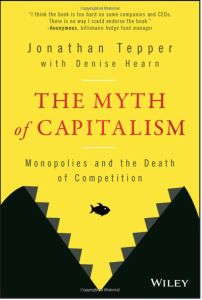In this illuminating examination of the early 21st-century economy, researchers Jonathan Tepper and Denise Hearn present a perhaps not-so-jarring idea: that, for all the focus on it today, wealth and income inequality is just a symptom of what ails capitalism rather than a root cause of its malaise. A lack of competition is the real culprit, according to the authors, who make a persuasive case that concentrated economic power stifles competition and adds to inequality. This informative text, presented in an accessible and organized manner, balances erudite explanations with lighter moments of dry wit. It offers general readers and experts alike an insightful, fresh perspective on highly topical and important economic issues.
Uncompetitive Markets
The billionaire investor Warren Buffett does not like competition; he believes it limits a company’s ability to raise prices. He prefers investing in monopolies, but absent a monopoly, Buffett’s second-best choices are in sectors with a limited number of competitors. His investments have included the Buffalo Evening News, a monopoly in a geographic area, and the rating agency Moody’s Corporation, which enjoys a duopoly together with Standard & Poor’s.
Buffet shares this view with the Silicon Valley mogul Peter Thiel, founder of PayPal, who has invested in the monopoly Facebook and declared that “capitalism and competition are opposites.” Some investment gurus and even economists have gotten on the bandwagon of recognizing monopolies as an “enlightened form of capitalism.”
A notorious example of the pricing power of monopolies is the cable television industry. According to the Consumer Federation of America, cable companies use their exclusive local franchise clout to overcharge the average consumer $540 annually.
In the United States, oligopolies (in which only three or four firms dominate) and duopolies...




















Comment on this summary